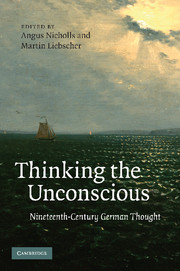Book contents
- Frontmatter
- Contents
- Notes on contributors
- Introduction: thinking the unconscious
- 1 The unconscious from the Storm and Stress to Weimar classicism: the dialectic of time and pleasure
- 2 The philosophical significance of Schelling's conception of the unconscious
- 3 The scientific unconscious: Goethe's post-Kantian epistemology
- 4 The hidden agent of the self: towards an aesthetic theory of the non-conscious in German romanticism
- 5 The real essence of human beings: Schopenhauer and the unconscious will
- 6 Carl Gustav Carus and the science of the unconscious
- 7 Eduard von Hartmann's Philosophy of the Unconscious
- 8 Gustav Theodor Fechner and the unconscious
- 9 Friedrich Nietzsche's perspectives on the unconscious
- 10 Freud and nineteenth-century philosophical sources on the unconscious
- Epilogue: the “optional” unconscious
- Works cited
- Index
- References
8 - Gustav Theodor Fechner and the unconscious
Published online by Cambridge University Press: 04 August 2010
- Frontmatter
- Contents
- Notes on contributors
- Introduction: thinking the unconscious
- 1 The unconscious from the Storm and Stress to Weimar classicism: the dialectic of time and pleasure
- 2 The philosophical significance of Schelling's conception of the unconscious
- 3 The scientific unconscious: Goethe's post-Kantian epistemology
- 4 The hidden agent of the self: towards an aesthetic theory of the non-conscious in German romanticism
- 5 The real essence of human beings: Schopenhauer and the unconscious will
- 6 Carl Gustav Carus and the science of the unconscious
- 7 Eduard von Hartmann's Philosophy of the Unconscious
- 8 Gustav Theodor Fechner and the unconscious
- 9 Friedrich Nietzsche's perspectives on the unconscious
- 10 Freud and nineteenth-century philosophical sources on the unconscious
- Epilogue: the “optional” unconscious
- Works cited
- Index
- References
Summary
In his 1873 review of Eduard von Hartmann's Philosophy of the Unconscious (Philosophie des Unbewussten, 1868), Rudolf Haym attributed to the idea of the unconscious a contribution to the emergence of German idealism equal to that made by the philosophy of Kant. “Out of the stimulating contact between the intellectual views and intuitions of Jacobi, Goethe and Herder [in relation to the unconscious] and the Kantian philosophy as it was refined by Fichte,” he wrote, “there grew the thoroughly idealistic systems of Schelling and Hegel.” According to Haym, the idea of the unconscious, which was most explicitly discernible among the aforementioned figures, surfaced in the second half of the eighteenth century “under the influence of the sensualist views of the English and the French” and then as now demanded that the “rights of the emotions as opposed to those of the understanding, of natural talent as opposed to acquired skill, of the original powers of the mind as opposed to those of statutes and rules” once again be recognized. The idea of the unconscious, Haym argued, directed itself “against the one-sided arrogance of rationality [and] against the over-valuation of that which is conscious, contrived, and reflected.” For Haym, the major contrast between his own period (that of the 1870s) and the time of Jacobi, Goethe, and Herder lay precisely in relation to German idealism: while German idealism still lay in front of the early thinkers of the unconscious like Jacobi, Goethe, and Herder, its contemporary representatives had it behind them and therefore had to acknowledge its weaknesses, especially in the light of empirical science.
- Type
- Chapter
- Information
- Thinking the UnconsciousNineteenth-Century German Thought, pp. 200 - 240Publisher: Cambridge University PressPrint publication year: 2010
References
- 2
- Cited by



